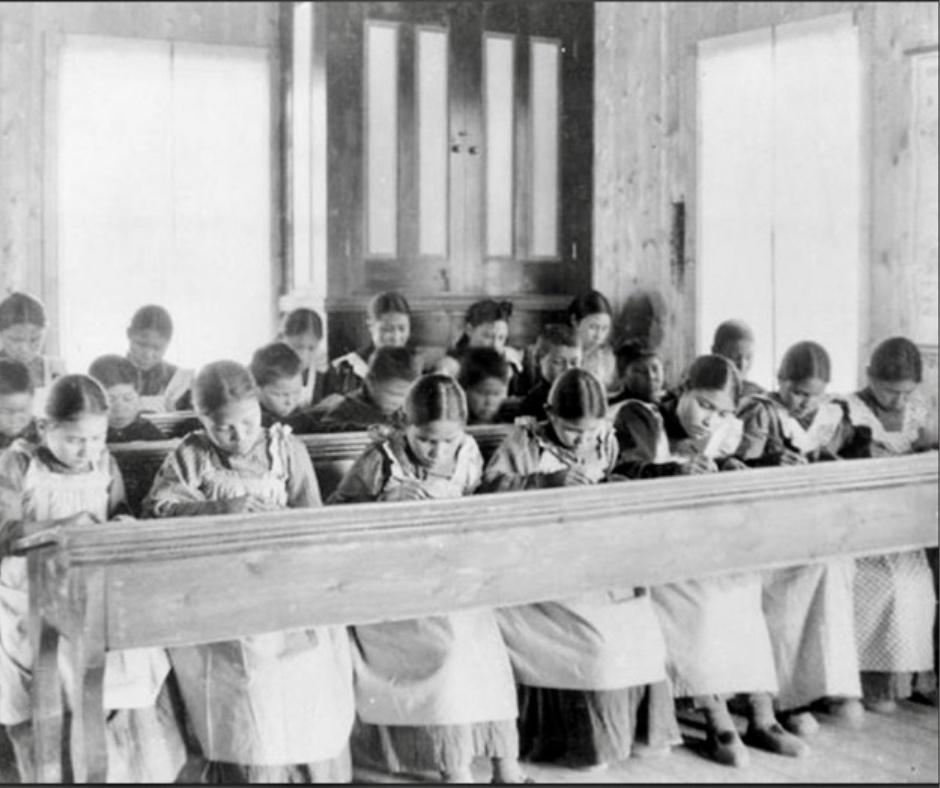
(June 28, 2021) The discovery of hundreds, soon to be thought to be thousands of the unmarked graves of Indigenous children has made it clear “nice” is no longer one of Canada’s “brand values.” For decades, Canada has dined out on its international reputation for affability and harmlessness. But as the attempted genocide of Indigenous people becomes impossible to look away from, new words to describe the country will have to be sought out.
Since Chief Cadmus Delorme’s announcement of the most recent discovery of 751 unmarked graves on the grounds of Marieval Indian Residential School at Cowessess First Nation last Thursday, we’ve watched as Indigenous leaders and residential school survivors run a grueling gauntlet of media appearances. We’ve heard the prime minister’s platitudes and an apology from Don Bolen, the Roman Catholic archbishop of Regina.
Hopefully Canada is listening. Because the world is.
From India to Germany, Africa to China, Europe and the United States Canada’s attempted genocide of its Indigenous people is breaking news all over the world.
Both the Washington Post and the New York Times are publishing extensively about the residential schools and the abuses and deaths associated with them.
The Guardian has been following the story since the discovery of 215 unmarked graves on the grounds of the Indian Residential School in Kamloops, British Columbia. They’ve published at least 11 articles on the still-developing story since June 1, including one by Canadian Indigenous leaders, Cindy Blackstock and Pam Palmater.
The Times of India has published multiple articles on the residential school system, the history of abuse and the recently found unmarked graves.
In France, La Monde has used the term “génocide culturel,” in accordance with the findings of the Truth and Reconciliation Commission. AfricaNews reported on the toppling of Edgerton Ryerson’s statue in Toronto and the 215 graves in Kamloops.
German publication, Deutsche Welle (DW) referred to “Canada’s violent history,” in writing about our colonial past and the damage and distress it has done to Indigenous people in the present. DW is Germany’s international broadcaster. In 2020, it published in 30 languages reaching 249 million weekly users.
Qatar-based Al-Jazeera published a podcast episode about the residential school unmarked grave sites, which included testimony from a residential school survivor, suggesting Prime Minister Justin Trudeau might be all talk when it came to Indigenous issues, and relayed the discomfort that many feel at the thought of ‘celebrating’ the country’s history on Canada Day July 1. Al Jazeera is the first English-language news channel to be headquartered in the Middle East.
Finger-wagging is a feature of the coverage coming from China.
“We hope the Canadian government, instead of going in circles with oral apologies and superficial justice, will take stronger measures to find out the truth, ensure accountability and compensation, and adopt policies to earnestly protect the rights of indigenous peoples,” said Chinese foreign ministry spokesperson Zhao Lijian on Friday, according to China Daily, a publication owned by the Publicity Department of the Central Committee of the Communist Party of China and the widest print circulation of any English-language newspaper in China.
In March, Justin Trudeau rebuked the Chinese government for its treatment of the Uighur population in China. But now that the shoe is on the other foot, many Canadians are asking themselves how can we exhort other countries to do what we did not practice and have failed to make reparations for?
An editorial in China Daily called Canada a ‘hypocritical human rights champ[ion].” A Chinese press agency is not necessarily where we go for the truth, but on this issue, they have seized on the apparent hypocrisy and provided another opportunity for dictatorships and authoritarian governments to mock democracies as a favoured form of government.
It’s still unclear what meaningful long-term actions Canadian citizens or the Canadian government are going to take now that the existence and implications of these terrible findings are impossible to ignore. There is hope the country can be strong and compassionate enough to change.
But other international news coming from Canada might give pause. The BBC has recently reported on the murder of a Muslim family in London, Ontario, which is being called a racist and terrorist act.
The Guardian is writing about Quebec’s ban on religious symbols, the logging of old-growth forests and the plant and animal species we are consuming into extinction, despite the pleadings of Indigenous people and activists.
China Daily is also reporting on the anti-Asian racism that has become even more rampant since the start of the COVID-19 pandemic. Deutsche Welle (DW) is writing about the deaths and disappearances of thousands of indigenous women.
Canada has many serious problems, and many of them are directly related to our centuries-long abusive treatment of Indigenous peoples. It is crucial that we face our past and present with honesty and do something about it. We no longer have Donald Trump’s chaos to hide behind, and the world can see right through us.
“Nice” wasn’t a word that resonated with many Canadians in the first place. New words will be found to describe this country. The response to this crisis will determine what those words are.
Related reading
Commemorating National Indigenous Peoples’ Day: Reflecting on the work of four stunning Indigenous artists June 21, 2021
Canada’s first Indigenous hospice gets glimmer of hope at Six Nations of the Grand River May 4, 2021
Report on the death of Colten Boushie further stains RCMP April 7, 2021
‘Emotional tax’: the extra stressors that Indigenous people experience in the workplace March 22, 2021
How to be a kid in a country that can’t tell you the number of children dying in care November 17, 2020
Indigenous language: More than words July 20, 2020